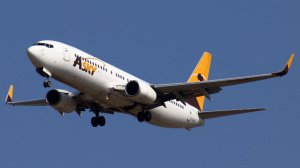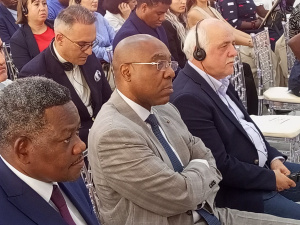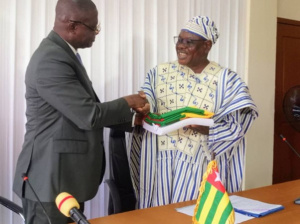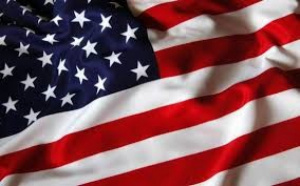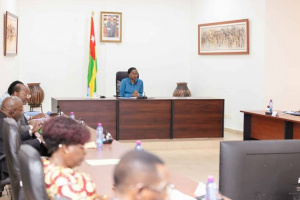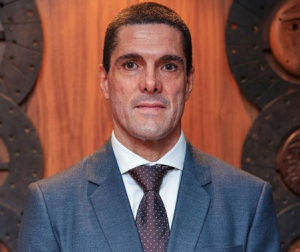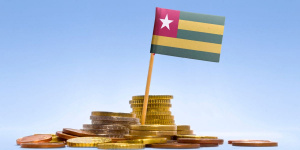Togo First
Togo: ECOWAS Plans to Lower Airfares Starting January 2026
Economic Community of West African States (ECOWAS) transport ministers met in Lomé from November 5 to 8 and adopted a plan to reduce airfares in the region. This plan will be presented to ECOWAS Heads of State in December for approval and is expected to take effect in January 2026.
The roadmap includes actions such as eliminating taxes that do not comply with International Civil Aviation Organization (ICAO) standards and reducing passenger and security charges by 25%. The ministers noted that taxes and fees currently account for nearly 50% of the total cost of air tickets in West Africa; hence burdening travelers and affecting the competitiveness of local airlines. According to the International Air Transport Association (IATA), airport taxes and charges in West Africa can exceed $100 per passenger, compared to a global average of $40 in 2023.
These reforms aim to ease travel costs and boost the air transport sector while maintaining safety protocols aligned with international standards. A transition phase in 2025 will allow member states to make necessary legislative and budgetary changes.
ECOWAS also plans to engage international partners for support and will establish a Regional Oversight Committee to ensure commitments are met. The initiative aligns with continental projects like the African Continental Free Trade Area (AfCFTA) and the Single African Air Transport Market (SAATM), which aim to enhance connectivity across Africa.
Esaïe Edoh
Togo : Aného Hosted Togo-Turkey Economic Forum on November 18
The Togo-Turkey Economic Forum took place on November 18, 2024, in Aného, located about 40 km southeast of Lomé. The event was held alongside the Festival International d'Histoire d'Aného (FIHA) and gathered around 20 Turkish companies that came to explore investment opportunities in various sectors. The Turkish group was coordinated by the Turkish Foreign Economic Relations Board (DEIK), led by Abide Gülel.
At the event, themed "Investing in Togo and Turkey", Togolese representatives highlighted the country's economic advantages and the role of the Investment Promotion and Free Zone Agency (API-ZF) in supporting projects.
En marge du FIHA @Festivals_aneho, 2024, la ville historique d'Aneho accueille le Forum Économique Turquie-Afrique.
— Conseil National du Patronat du Togo (@CnpTogo) November 18, 2024
Les investissements entre le Togo et la Turquie ont plus que doublé, atteignant plus de 300 millions de dollars US. ?? pic.twitter.com/RHKfPWsB00
The forum included business-to-business meetings and networking sessions, allowing Turkish companies active in sectors like infrastructure, tourism, agriculture, and new technologies to connect with Togolese partners. Muteber Kılıç, the Turkish ambassador to Togo, who attended the forum, said it would strengthen bilateral relations, noting that Turkey considers Togo a key partner in Africa, both in economic and cultural terms.
Economic ties between Togo and Turkey are growing. Trade between the two countries reached $300 million at the end of 2023, according to the Turkish embassy in Togo.
Esaïe Edoh
Togo to Launch Djanta Tech Hub in Lomé to Boost Entrepreneurship
Togo is set to launch the Djanta Tech Hub in Lomé, a technology center designed to transform the country's entrepreneurial ecosystem. Founded in 2018 and covering an area of 3,000 square meters, the Djanta Tech Hub is supported by Co-Creation Hub (CcHub), an innovation and technology entrepreneurship organization based in Nigeria. The new hub will support Togolese startups, particularly in the tech, agritech, and edtech sectors, following the successful model of iHub in Nairobi.
“It will be a hub managed by CcHub - the hub belongs to the government of Togo, but we will set it up and manage it for them,” said Ojoma Ochai, managing director of CcHub and head of iHub operations, as quoted by TechCabal.
The Djanta Tech Hub will include several strategic components, such as Djanta Academy, a center for digital training, and Djanta Start, a business accelerator and incubator. It will also house NanaTech, a space dedicated to businesswomen, and Djanta Lab, a space focused on prototyping and research.
Additional facilities will include coworking spaces, conference rooms, and a one-stop shop for startups' administrative needs. In preparation for the launch, several key positions are being filled through recruitment organized by the supervisory ministry.
Ayi Renaud Dossavi
Babarime Akatao Takes Office as New Director General of Togo's National Police
Divisional Police Commissioner Babarime Akatao took office as the new Director General of the Togo’s National Police on November 12, 2024. The handover ceremony was held at the National Police Headquarters (DGPN) in Lomé and presided over by the Minister of Security, Calixte Batossi Madjoulba. Akatao replaces Colonel Yaovi Okpaoul, who has held the position since April 2019.
In his inaugural address, Akatao acknowledged the significant responsibilities that accompany his new role. “We are fully aware of the magnitude of this mission, an immense responsibility which requires not only unfailing commitment but also, above all, a clear vision and constant determination to achieve our objectives and protect our republican values.” he declared.
Babarime Akatao has a master’s degree in law, specializing in judicial careers, and another master’s in internal security. He trained at the Kpewa National Commando Training Center, graduated in 2005, and has occupied various positions within the police force since then. Before being appointed as Director General, he served as the central commissioner for the city of Lomé.
Ayi Renaud Dossavi
Togo: Taïrou Bagbiegue takes office as Governor of the Maritime Region
Taïrou Bagbiegue is the new Governor of Togo’s Maritime Region. Appointed on August 23, 2024, by President Faure Gnassingbé, Bagbiegue officially took office on November 12. The inauguration ceremony took place in Tsévié, the region's capital, and was attended by various political and traditional leaders.
Col. Awate Hodabalo, the Minister in charge of Territorial Administration presided over the ceremony. He underscored the challenges associated with administrative deconcentration, stating "Deconcentration remains a vast undertaking and a huge task. Each player must play his part alongside the government and the governor."
In his address, Taïrou Bagbiegue highlighted the importance of harmonious cooperation among the decentralized services of various sectoral ministries. "From now on, we'll all have to work together to ensure the success of development projects initiated by the government and involving our region. It is my duty to ensure that this dynamic is a real strength, based as it is on trust, sharing, and cohesion. I am committed to sharing my experiences and initiatives with you," he remarked.
Bagbiegue previously held several high-profile roles, including Minister of Mines and Energy since 2012 and Minister of Technical Education, Training, and Professional Integration since 2020.
The week before he took over, Zouréhatou Kassah-Traoré was inaugurated as Governor of Greater Lomé. According to recent government announcements, three additional appointments are anticipated: Affoh Atcha-Dedji as governor of the Savanes region, Komlan Adjitowou in the Kara region, and Dadja Maganawé in the Plateaux region.
Ayi Renaud Dossavi
Togo: U.S. Embassy Launches Small Grants Program for 2025
The U.S. Embassy in Togo launched its Public Diplomacy (PD) small grants program for 2025 on November 8. The embassy has opened a call for project proposals from interested organizations, with submissions accepted until July 31, 2025. This funding initiative is designed to support Non-Governmental Organizations (NGOs), Civil Society Organizations (CSOs), think tanks, and both public and private educational institutions.
Successful projects will be financed, through grants, fixed-amount fellowships (FAA), or cooperation agreements with the U.S. Embassy in Togo. The financial backing for these initiatives will range from $10,000 to $25,000 per project, with a total budget of $60,000 allocated for the entire program.
Proposed initiatives must align with the embassy’s strategic themes, including peace and security, strengthening democratic institutions, and promoting economic growth and development. The projects can take various forms, such as academic conferences, professional seminars, artistic workshops, and academic exchanges, fostering diverse approaches to meet development and cooperation needs.
Togo and World Bank Approve 2025 Work Plan for CoSo Project
Earlier this week, Togo's government and the World Bank approved the 2025 work plan and budget for the country's social cohesion project in the northern regions of the Gulf of Guinea (CoSo). Details of the plan have not yet been disclosed but it aims to enhance regional collaboration to make border communities more resilient to climate and socioeconomic shocksimprove the socio-economic and climatic resilience of border communities. This decision follows satisfactory results from the project's implementation over the past two years, as reported by the steering committee during a meeting with Prime Minister Victoire Tomégah-Dogbé.
"After more than two years of implementation, we have all noted significant progress in the project's priority sectors. The sectors of education, energy, water, agriculture, grassroots development, and youth have been strongly impacted, mainly in the Savanes region, which accounts for 90% of the beneficiary cantons," said Prime Minister Tomégah-Dogbé.
According to Fily Sissoko, World Bank Resident Representative, "Togo has achieved the best results to date." This success is largely due to the opening of the Community and Refugee Support Window, which has helped mobilize $23 million in funding for vulnerable populations.
The CoSo project aims to enhance regional collaboration and improve the socio-economic and climatic resilience of border communities in the northern Gulf of Guinea countries. The initiative has received an investment of CFA33 billion from the World Bank, along with nearly CFA14 billion in additional funding.
Esaïe Edoh
Diogo Victoria Becomes New Director General of BB Lomé
BB Lomé has appointed a new director general. Diogo Victoria has taken over from Thierry Feraud, who held the position for the past eight years. The handover ceremony took place on November 12, 2024. BB Lomé is Togo’s leading brewer, part of the French Castel group.
Rose Kayi Mivedor, Togo's Minister of Trade, attended the ceremony and thanked Feraud for his years of service to BB Lomé. Other attendants included Jonas Daou, President of the Association des Grandes Entreprises du Togo (AGET), and Augustin Favereau, the French Ambassador to Togo.
Diogo Victoria brings over 15 years of experience in the fast-moving consumer goods (FMCG) industry, particularly in Africa and the Middle East. Before joining BB Lomé, he worked at Saudi Dairy & Foodstuff Company (SADAFCO), where he held several roles, including Director of Commercial Operations and Sales Director. He also worked with Lactalis Group as Director of Business Development for the Middle East and Africa.
BB Lomé has been operational for 60 years and employs approximately 1,200 people directly across its production sites, with an additional 6,000 jobs indirectly related to its operations.
Ayi Renaud Dossavi
WAEMU Market: Ivorian Investors Lead Togolese Domestic Debt Holdings
From January to September 2024, Côte d'Ivoire financed the Togolese economy with CFA513 billion. According to the latest data from the WAEMU Securities market, this amount represented 24.8% of Togo’s domestic debt holdings. Ivorian investors were closely followed by Senegalese and Togolese investors, with 22.7% and 22.8% shares, respectively, amounting to CFA472 billion and CFA469 billion. The three countries represent nearly 70% of Togo's public securities issuance.
Benin and Burkina Faso are behind these leaders, with outstanding amounts of CFA269 billion and CFA240 billion, 13% and 11.6% of the total. In contrast, other WAEMU countries like Mali, Niger, and Guinea-Bissau accounted for less than 5% combined. As of the end of October 2024, Togo's total outstanding debt to regional investors reached CFA2,074 billion.
This concentration of creditors primarily from Côte d'Ivoire, Senegal, and Togo provides a stable source of financing for Lomé but also exposes the country to the economic conditions of these major economies and potential liquidity issues in their markets. The main holders of this debt include commercial banks, insurance companies, pension funds, and Sociétés de Gestion et d'Intermédiation (SGI).
In Côte d'Ivoire, significant players include Société Générale Côte d'Ivoire, Banque Atlantique, Banque Nationale d'Investissement (BNI), and Ecobank. In Senegal, key investors are Banque Internationale pour le Commerce et l'Industrie du Sénégal (BICIS) and Caisse des Dépôts et Consignations (CDC), while in Togo, Orabank Togo, Ecobank Togo, and Coris Bank are notable holders in the public securities portfolio.
Fiacre E. Kakpo
WAEMU: Togo Was the Only Country to Not Raise Funds on Public Securities Market in October
Togo did not conduct any operation on the West African Economic Monetary Union (WAEMU) public securities market last month. Meanwhile, neighboring countries raised CFA659 billion on this market over the period to finance their budgets.
Initially, Togo had planned to raise CFA15 billion through the market, but the operation did not occur. This month, also, Lomé postponed an issue scheduled for November 8, in which the country was to raise CFA22.5 billion.
Togo has raised CFA638.5 billion on the market so far this year–CFA449.96 billion in fungible treasury bills (BATs) and CFA188.53 billion in fungible treasury bonds (OATs). The country has continued to meet its financial obligations, repaying CFA507 billion so far this year, with an additional CFA15 billion due in November and over CFA65 billion due in December.
Togo's outstanding debt on the WAEMU market currently stands at CFA2,074 billion, accounting for 12% of the region's total debt, making it one of the leading debtors in the zone.
Fiacre E. Kakpo

